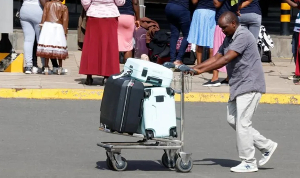Government has missed out on the opportunity to save nearly US$560m in debt servicing costs after it elected not to take part in a debt relief initiative for lower income countries badly hit by the pandemic.
The Debt Service Suspension Initiative (DSSI), championed by the International Monetary Fund (IMF) and the World Bank, was established last year by the Group of 20 (G20) countries to enable poor countries temporarily defer their debt service payments to official bilateral creditors—that is, rich-country creditors—and instead channel the savings to the fight against Covid-19.
According to the World Bank, Ghana could have postponed the payment of US$558.1m in external debt service liabilities to official bilateral creditors between May 2020 and December 2021 had it signed up for the initiative.
In an interview with Business24, an economist and fellow with think tank Imani Africa, Dr. Theo Acheampong, said notwithstanding the benefits of the initiative, government was justified in not taking part.
“I don’t think Ghana not participating in the DSSI scheme is necessarily a bad thing. In any case this is just debt which is deferred or kicked down the road and not reprofiled or restructured, the latter being more important for many countries,” he explained.
“The DSSI, at the time it was rolled out in the early days of the pandemic, came with a lot of concerns by some countries and market players, such as restricted access to borrowing in commercial markets or increase in debt servicing costs due to likely credit rating downgrades for countries like Ghana who like to issue Eurobonds,” he added.
Another economist, Courage Martey, who is a senior analyst with Databank, the asset management company, said participating in the G20 initiative would have had unpleasant consequences for government’s fiscal operations.
“We need to understand that if a country applies for debt service suspension, that would definitely have an adverse impact on its sovereign credit rating. The rating agencies would definitely downgrade your credit quality, and that would lead to a punitive cost of issuing new bonds.”
According to Mr. Martey, government probably weighed the potential savings from the DSSI against the potential DSSI-induced spike in borrowing cost.
“If government plans to issue new debts, then signing up for the DSSI may not be an optimal decision, because the subsequent spike in borrowing cost could offset the potential saving from the DSSI. If government had signed up for the DSSI before going on to issue the 2021 Eurobond, the coupon rates secured would have been very punitive and wouldn’t have yielded any economic benefit for a market access country like Ghana,” he added.
With Ghana classified as being at high risk of both external and overall debt distress, Dr. Acheampong urged government to instead explore the G20 Common Framework for Debt Treatments, beyond the debt service suspension programme.
In his opinion, the framework is a much longer-term solution for dealing with debt issues considering its objective of coordinating debt reprofiling and restructuring by both official and private creditors—thus extending the scope beyond the modest debt deferral available under the DSSI.
Business News of Friday, 21 May 2021
Source: business24.com.gh













